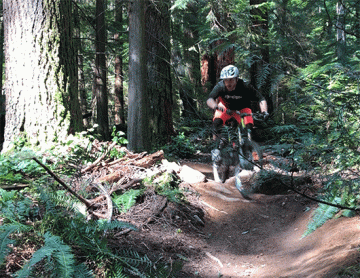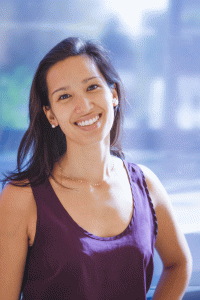![]() Students with Hyman Gee (Right) |
Happy Anniversary Student Run Outpatient Clinic and clinic supervisor, Hyman Gee!
|
Time and time again, students comment “My placement at Queen’s Park Student-Led Clinic stands out.”
The Student Rehabilitation Outpatient Clinic (SROC) originated at Royal Columbian Hospital (RCH) in 2009. Funding cuts led to the closure of the outpatient program at RCH, however, some innovative thinking and advocacy fueled a proposal to re-instate the program with a twist – a physiotherapy service led by physiotherapy students on clinical placements. Through a partnership between The University of British Columbia (UBC) and the Fraser Health Authority a novel teaching and service delivery model was developed, the first of its kind in the province.
Hyman Gee took on the challenge of developing and implementing this new model. He had practiced as a physiotherapist for 10 years in a variety of practice settings – from acute care, public practice outpatient and private practice. He brought a wealth of experience from cardiac and respiratory units, neurology units, orthopaedics, intensive care and even neonatal intensive care. He had supported physiotherapy students on placements previously, though never more than two at a time!
“Little did I know this would be the chance of a lifetime and would stoke my passion for being a clinical educator”. Hyman
Throughout the development of the SROC, Hyman remained focus on two primary questions:
Who were the customers going to be? Who was he going to serve? Hyman concluded early in the development phase that his role would ‘serve’ a diverse caseload of patients while also ‘serving’ the learning needs of the physiotherapy students. Hyman has shared that he feels the experience and success of the students in the clinic directly influence the quality and success of physiotherapy care provided to the patients treated at SROC. The clinic provides a crucial public healthcare service that was missing in the local community.
Hyman has refined his approach to managing the needs of multiple (up to 6!) physiotherapy students on clinical placement at the same time in the clinic. He fosters an organized and supportive environment in which students can learn and thrive. He relies on peer coaching and peer learning approaches with ongoing mentorship from himself and ensures the students have fun along the way! Hyman’s approach to teaching, mentorship and clinical practice has influenced countless physiotherapy students.
Hyman was an excellent preceptor and professional role model. He has a very structured approach to how he educates both his students and his patients. This model of teaching worked well for me. Expectations were always clear. Hyman encourages regular reflection in the students he mentors. He regularly scheduled time for feedback and reflection with each student independently and together with other students in the clinic. This supported me in applying my clinical reasoning and I think helped me get the most out my placement experience. As a student, I was able to thrive in this supportive learning environment and build my confidence in my abilities to practice independently. Bev Larssen, MPT Graduate
SROC has evolved since its inception in 2009. It moved to Queen’s Park Care Centre in 2017. The clinic provides collaborative care and learning opportunities. Hyman has supported the professional and clinical skill development of medical students, rehabilitation assistant students, occupational therapy students, and physiotherapy students from across Canada and Internationally. The benefits of this collaborative practice model are plentiful and profound – firstly, for ensuring comprehensive, best practice care for the patients served. Secondly, in fostering a greater understanding of health trainees in the breadth and depth of their own scope of practice and the benefits of collaborative practice on health outcomes.
“It’s been extremely interesting and rewarding to see the students of the various professions learn while on placement and learn from each other. I have gained a different appreciation of not only what other health care professions can bring to a team but also what I can bring as a physiotherapist in the care of our clients. These partnerships and experiences have strengthened my practice and given the many students that have spent time in the clinic valuable interprofessional learning opportunities.” Hyman
This year marks the 10-year anniversary for SROC! Hyman is also celebrating an important milestone with a 20-year reunion in Montreal; he graduated from McGill in 1999 to begin his accomplished physiotherapy career. Hyman continues to provide exceptional support and mentorship to countless physiotherapy students and to the Department of Physical Therapy. We are so fortunate to benefit from his insights and experience through the UBC Physical Therapy and Research Clinic Steering Committee, the Clinician Advisors for Clinical Education Committee, the Advanced Communication Workshop for the MPT Students and various other engagements in the Department.
Hyman was an incredible educator and a great example of patient-centered practice. He was very encouraging and welcoming, which fostered a supportive environment for both patients and students to learn and grow. I appreciated the autonomy he provided, and how he encouraged us (his students) to always focus back on the patient’s goals. I also appreciated how organized he was as an educator, and his patience and encouragement towards our learning as brand new 1A students! Devon Chan, MPT Candidate 2019
Beyond these extensive commitments and contributions, Hyman enjoys an active family life. Hyman, his wife and their two school-aged daughters enjoy camping, hiking, and skiing. Hyman is highly trained in Martial Arts; with previous practice in Kung Fu, Tae Kwon Do, Hap Ki do, Wrestling, Judo, and Chinese Lion Dance. Now Dragon boating is his primary activity. He trains in False Creek and travels locally and beyond for races and regattas. I am at a loss for how he manages to fit it all in!
 Marie handles the details of financial processing, financial record keeping, and record retrieval for the Department. Marie also assists staff with diverse work projects, as required.
Marie handles the details of financial processing, financial record keeping, and record retrieval for the Department. Marie also assists staff with diverse work projects, as required.






























